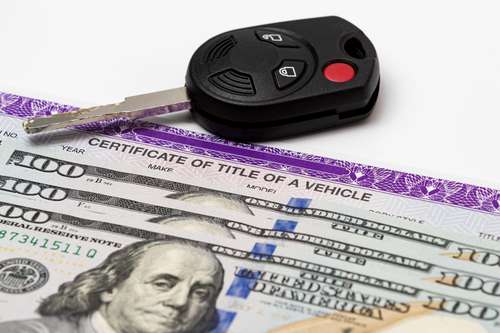Table of Contents
What are Texas Car Titles?
Texas car titles are legal documents used to prove the ownership of a vehicle. When purchasing a vehicle outright from a dealership, state law requires the dealer to title and register the vehicle in your name. The car, SUV, or truck title contains important information about the vehicle, such as the Vehicle Identification Number, the manufacturer year, make and model, and the current owner.
Whether you are replacing a lost or damaged car title or transferring ownership of a vehicle in Texas, understanding the ins and outs of the Texas car title system can be highly beneficial.

Replacing a Lost or Damaged Texas Car Title
You may be concerned if you have lost your Texas car title because it is an important document that shouldn’t fall into the wrong hands. When a vehicle title is misplaced, severely damaged, or destroyed, you can obtain a duplicate copy of your title by providing the right documentation and submitting an application at your local Department of Motor Vehicles (DMV) in Texas. You can apply by mail or in person at a DMV regional service center in Texas.
Below is a list of the paperwork you will need to apply for a duplicate automobile title in Texas:
- Proof of Identity: You will need to provide a valid government-issued ID, such as a driver’s license or passport, to verify your identity.
- Proof of Vehicle Ownership: To prove you are the rightful owner of the vehicle, you will need to provide the Vehicle Identification Number. An original release of a lien letter may also be required if a lien is still on the record for your car’s title.
- Application Form: You will need to fill out the Application for Texas Certified Copy of Title (VTR-34), which can be obtained online from the Texas Department of Motor Vehicles website or in person at a local DMV office.
Once you have gathered all the right paperwork, you can follow these steps to apply for a duplicate Texas car title:
- Double-Check the Application Form: Before you head to the DMV office, make sure that your form is complete and has accurate information, including the Vehicle Identification Number (VIN), your personal details, and any relevant lienholder information.
- Submit the Right Paperwork: Bring the completed application form, along with the required documents, to your local DMV office. You are encouraged to make an appointment ahead of time to ensure a smooth process.
- Pay the Applicable Fees: The fee for a duplicate title is $5.45, but additional fees may apply depending on your county. It’s best to check with your local county tax office to find out the exact amount you’ll need to pay for another copy of your car title.
Now, you might be wondering how long it takes to process a duplicate Texas car title application. The processing time can vary depending on various factors, such as the workload at the DMV and the accuracy of your application. Generally, it takes around 2-3 weeks to receive your car title after your application has been submitted. Once you have the title back in your hands, be sure to keep it in a safe place to avoid any future issues.

Transferring Texas Car Titles
Whether you are buying or selling a vehicle, it is essential to follow the necessary steps to ensure a smooth Texas title transfer process. Note that when purchasing a vehicle from a private party, the vehicle title must be in the new owner’s name within 30 days of the date of the initial transaction.
The buyer and the seller must sign the title and completely fill out the appropriate sections, which include providing the correct VIN, purchase date, the buyer’s contact information, the current odometer reading, and purchase price. Some states require the signatures to be notarized, but Texas isn’t one of them.
If there are any liens on the vehicle, they must be released before transferring a car title in Texas. Once the title is properly filled out, you will need to submit it to the Texas Department of Motor Vehicles (DMV) along with other required documents to complete the Texas car title transfer. Typically, that includes a completed Application for Texas Title (Form 130-U), proof of insurance, and proof of inspection if there are none currently on record for the vehicle. Depending on your situation, you may also need to provide additional documents, such as a bill of sale or a power of attorney form.
As part of the title transfer process, you can expect there to be certain fees and taxes that are involved. The Texas DMV charges a fee for the application for the title, which usually varies by county. In addition, you may be required to pay sales tax based on the sale price of the vehicle. It is recommended to contact your local county tax office or visit the Texas DMV website for more information on the fees and taxes applicable to your situation. By following the necessary requirements and completing the title transfer process correctly, you can ensure a smooth and legal transfer of car ownership as a resident of Texas.
Once your car title is in your name, you can apply for a ChoiceCash title loan in Texas! Call 855-422-7402 to learn more about unlocking emergency cash with Texas car titles.1





